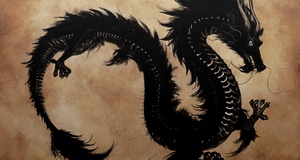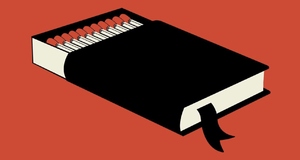Transmitting Values Through Literature: Considering Three Short Stories of Chinese Revolution
By
2015, Vol. 7 No. 04 | pg. 2/2 | « Meilin sees in her life that “now things were different. She needed something else! She wanted her own place in society. She wanted to have contact with many, many people” (Ding 1930, 125). Her newfound drive to create an identity for herself came from her boredom at home and the observation that her friends such as Ruoquan worked extremely hard. Her realization of her wants and needs constitutes both a criticism of bourgeois romantic literature and statement on human nature, that people cannot be totalized by their drive for love and attention from another human being. Meilin’s attempt to throw away everything for love culminates in this realization of her disappointment. It is the inauthenticity of bourgeois literary ideals that leads Meilin to this profound dissatisfaction with her life. Yet what concerns Ding Ling is not just that these ideals are false in that they do not represent true human aspirations and fail to account for the complexity of human beings. Through Ruoquan, she asks, “What good does it [writing bourgeois romantic literature] do society?” (Ding 1930, 116). Here, Ding Ling introduces her readers to the notion that literature ought to be useful, and furthermore, constructive for society. Ruoquan’s wish that “the other writers we know would give some thought to this problem…change direction a little” (Ding 1930, 116) conveys that writers ought to be responsible to society, because as has been examined above, they wield enormous power to shape and invigorate people’s ideals, and hence their modes of behavior and activity. Ding Ling explores what the responsible use of that power looks like. Meilin’s transformation leads her to assist in writing a factory newsletter while working alongside the proletarians she seeks to represent in her literature. To encourage her, Ruoquan’s fellow revolutionary activist Chaosheng expresses his wish for more intellectuals to work in the factories amongst the laborers in order “to create an authentic proletarian literature” (Ding 1930, 137). Ding Ling’s criticism of bourgeois romantic literature as false is echoed here, as this emphasis on authentic proletarian literature contributes to Ding Ling’s message that authenticity the key to creating socially responsible writing.However, the interaction between readers and literature is not purely governed by the interaction of their respective ideals. While writers have a responsibility to create authentic literature, readers need to be able to understand that writing and be capable of grasping the ideals as the author intended them to be grasped through their own reading abilities. If the readers are not able to read properly, they may reach the wrong conclusions from authentic writing, thereby distorting their perception of the ideals conveyed in the piece. Ding Ling mentions this issue, writing, “Chaosheng reminded Rquoquan, workers did not understand their style. They had to make it a little simpler and shorter” (Ding 1930, 119). Even so, abilities notwithstanding, assimilating literature properly also depends on having the right attitude towards reading. Xiao Hong’s 1936 piece Hands contains a pivotal moment in which the issue of reading literature with the correct attitude is raised. In this passage, the peasant-student Wang Yaming’s reaction to a specific scene in Upton Sinclair’s The Jungle, a classic of proletarian literature, clashes with the bourgeois narrator’s own reaction. In this scene, one of the principal characters Marija has collapsed in the snow, succumbing to an illness that a doctor refused to treat because she could not afford his services. Wang Yaming is nearly brought to tears speaking about how she felt upon reading the scene, recalling, “Marija is a very real person to me. You don’t think she died after she collapsed in the snow, do you? … I went for a doctor once myself, when my mother was sick, but do you think he would come?” (Xiao 1936, 184). It is telling that Wang Yaming had just returned the narrator’s copy, even though by not knowing Marija’s fate she had demonstrated that she did not finish reading the novel. Earlier in the story it was implied that Wang Yaming’s mother had died of her illness as “there’d be no one at home” (Xiao 1936, 184) if her father visited her too often. Thus, her refusal to read on and learn of Marija’s fate suggests that the story resonated so strongly with Wang Yaming’s personal experience that it empowered her own memories to dictate the outcome of the story. In contrast to Wang Yaming’s sympathetic reaction to Marija’s tragedy, the bourgeois narrator is moved by the natural circumstances of the scene. The narrator recalls, “I was reading aloud the passage in Sinclair’s The Jungle where the young girl laborer Marija had collapsed in the snow. I gazed out at the snow-covered ground outside the window and was moved by the scene” (Xiao 1936, 184). The narrator explicitly reveals that the scene moved her, thereby specifying that rather than compassion or sympathy at the tragedy befalling Marija, it is the snow outside that stirred the narrator’s emotions. Looking into the attitude of the narrator in reading the scene suggests that her eyes were searching for natural imagery and that her mind was prepared only to react specifically to such images. This event recalls Qi Hong and his definitive expression of bourgeois sensibilities established in Red Beans, through its focus on natural imagery rather than the human condition. Like Qi Hong, the narrator has been taught by her exposure to bourgeois culture to focus on natural aesthetics, creating a mental attitude that prevents her from understanding the socialist message of The Jungle. This scene in Hands also shares much in common with a moment in Red Beans, when Jiang Mei recalls, “She had discussed the book [Wuthering Heights] with Qi Hong; he had such profound views on it that Jiang Mei felt he should understand more about life than most people. Yet for some reason, he did not” (Zong 1957, 267). Here, the ability to read is not relevant as a requirement for literature to properly change one’s modes of feeling, acting, and being. Arguably, the poorly educated Wang Yaming is less proficient than the narrator at linguistically understanding the text of The Jungle. However, by virtue of her experiences, only Wang Yaming understands the emotions and messages encoded within that very text, while the narrator finds herself lost in the snow. Thus, there is a limitation to how literature actually impacts its audience regardless of its aims. Literature is, in part, dependent on the reader’s attitude and prior literary exposures in order to effectively alter their modes of feeling, being, and activity. Through an investigation of Zong Pu’s Red Beans, Ding Ling’s Shanghai, Spring 1930, and Xiao Hong’s Hands, the powers and limitations by which literature actually provides and effects modes of feeling, being, and activity for its readers have been analyzed. While literature has the power to construct and affirm people’s ideals, by appealing to existing feelings or old memories, and thereby determining their modes of expression, it is limited to the abilities and attitudes of the readers. Where do those attitudes arise? As exemplified by Wang Yaming and Jiang Mei, it is in part caused by prior life experiences. For the narrator of Hands, it is possible that her training in a bourgeois school shaped her attitude towards reading. While the attitudes taken for reading may reflect strongly individualized circumstances, it speaks to an impressive commonality throughout humanity that literature can have such a broad appeal. Indeed, while experiences and educational training may prejudice the way people read literature, authors must take such boundaries into account. As Zhou Zuoren said in the words of Leonid Andreyev, literature ought to “erase all boundaries and distances.” In other words, people shouldn’t have to have the “right” experiences or “proper” training in order to learn from literature. Rather, it is a responsibility of literature to openly challenge those experiential and educational biases for everyone. ReferencesXiao Hong. (1936). “Hands.” Trans. Howard Goldblatt in Joseph Lau and Howard Goldblatt, eds. (1995). Columbia Anthology of Modern Chinese Literature. New York: Columbia University Press. Zhou, Zuoren. (1920). “Women and Literature.” Trans. in Kirk A. Denton, ed. (1996). Modern Chinese Literary Though: Writings on Literature: 1893-1945. Stanford: Stanford University Press. Zong Pu. (1957). “Red Beans.” Trans. Geremie Barme, in Amy Dooling, ed. (2005). Writing Women in Modern China: The Revolutionary Years, 1936-1976. New York: Columbia University Press. Ding Ling. (1930). "Shanghai, Spring, 1930: Part 1." Trans. in Tani Barlow and Gary J. Bjorge, eds. (1989), I Myself Am a Woman: Selected Writings of Ding Ling. Boston: Beacon Press Books. Suggested Reading from Inquiries Journal
Inquiries Journal provides undergraduate and graduate students around the world a platform for the wide dissemination of academic work over a range of core disciplines. Representing the work of students from hundreds of institutions around the globe, Inquiries Journal's large database of academic articles is completely free. Learn more | Blog | Submit Latest in Literature |


















